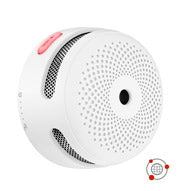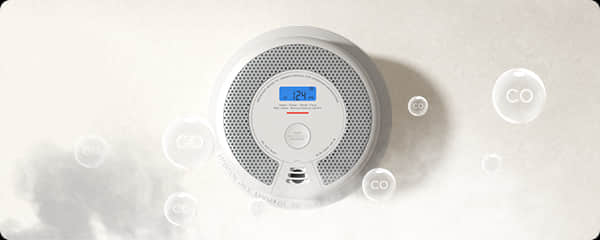Smoke Detector Types: Which Type of Smoke Detector Is Best?
Wed, Mar 31, 2021
Today, there are different types of fire alarms in the market. Choosing a smoke alarm is based on the design of your job site and the type of fire that is most likely to occur on the particular job site.
However, regardless of the type of smoke alarm or detector, you select, proper installation, testing, and maintenance of the device are very important. Here in the following blog, we will learn everything about different Smoke Detector Types.
What Are the Different Smoke Detector Types?
Generally, there are four types of smoke detectors available in the market. Here we give you details in the following:
1. Ionization/Photoelectric Smoke Detector
The main function of a smoke detector is to warn a fire by generating an alarm signal, but when choosing the detector to use, we must consider the two types of smoke detectors, that is, its detection characteristic.
Ionic smoke detectors are especially sensitive to fumes that contain small particles (from .01 to 0.4 microns), they are more sensitive to the presence of fast-growing fires and non-visible smoke, such as that generated in combustion fires. fast caused by gasoline, alcohol, oils, plastics, chemical liquids, etc.
For their part, photoelectric detectors are used to detect fires with a slower propagation speed, which generate visible black smoke (with smoke particles ranging from 0.4 to 10 microns), such as those generated in fires where we have fueled such as woods, leather, wool, and most polymers.
However, you can mix up both of these types of smoke alarms. Thus, you can create the safest environment possible for your family.
2. Photoelectric Smoke Detector
Photoelectric smoke alarms work on the principle of light scattering. Inside the detector, the chamber is a light-emitting LED and a photosensor. The light emitted by the LED falls on an area of the camera where it cannot be captured by the photosensor, this is the "normal" condition of the detector.
When a fire is generated, smoke is also generated that enters the detector chamber and obscures the environment in which the light emitted by the LED spreads. This causes the light from the said emitter to be dispersed and reflected towards the photosensor, that when receiving the light generates the alarm condition.
3. Ionization Smoke Detector
Ionization smoke detectors respond quickly to fast flames fires. They detect particles that are too small to influence light. They work because they are sensitive to humidity, atmospheric pressure, and airborne particles. They react quickly to the presence of smoke and are cheaper than the photoelectric type.
Ionization smoke alarms use ionized particles to identify the smoke presence. It holds a tiny size of radioactive material, that is kept between 2 electrically charged plates.
The response between these modules reasons the ionization of air. It in turn produces a current between these two plates.
4. Heat Smoke Detector
Heat smoke detectors immediately inform the control panel in the event of a fire and thus ensure that the retention system is activated in time.
The smoke detector detects a possible fire quickly and reliably based on the increase in the amount of smoke. In some cases, heat detectors are also used, which register a rapid increase in temperature or the reaching of a certain ambient temperature, which causes them to come into action.
What Are the 2 Types of Smoke Detectors?
Usually, there are 2 types of Smoke Detectors you will find in the market. These two well-known technologies are photoelectric and ionization smoke detector systems.
Photoelectric Smoke Detector
This smoke detector equipment allows early warning of the presence of smoke in the environment. It has a photoelectric sensor detection system, which is why it is more sensitive to detecting smoke from woods, fabrics, and other similar materials.
The photoelectric smoke detector is resistant to dust and fungi, which is why it is a very useful element for fire protection in buildings and houses, also to include in monitoring and alarm centers. This smoke detector only requires a common 9V battery for its operation, it does not require expensive electrical installations, special wiring, power supply, or channeling. Installation is very simple and can be done by anyone, without the need for any electrical knowledge.
Ionization Smoke Detector
They detect particles that are too small to influence light. They work because they are sensitive to humidity, atmospheric pressure, and airborne particles. They react quickly to the presence of smoke and are cheaper than the photoelectric type.
Which Is Better Photoelectric or Ionization Smoke Detectors?
In both of these smoke detector types, ionic and photoelectric smoke detectors, their response spectrum is wide enough for widespread use - so which one should I use?
This is a difficult question to answer since it is very difficult to determine the size of particles that can be released in a given fire since there is a considerable variety of fuels, which can have different effects. In different situations, for example, if we throw a lit cigarette on an armchair or a bed, it will generate gradual combustion that in turn will generate visible smoke. But if that same cigarette falls on paper or newspaper, which is on the bed will generate flames, more quickly.
As we must choose a smoke detector to protect our life and our heritage, we must choose one that gives us notice promptly, and also that is less prone to false alarms, and for this choice, we consider the following:
- Photoelectric smoke detectors are more used for homes and offices, since they have a detection spectrum focused on fuels such as wood, wool, cotton, etc. These are found in greater numbers in homes and offices, clothing stores, and furniture stores. In addition to being less prone to false alarms in controlled environments.
- For their part, ionic detectors can be more effective in laboratories, workshops, paint stores, or industries where alcohols, solvents, and all kinds of fast-burning materials are used.
Also please note: that they use a radioactive swab and even though the radioactivity it generates is not a health problem, there is always the risk of an accident and that the swab mixes with the environment, generating a contamination problem, in addition to Due to its great sensitivity, it is more prone to false alarms caused by the accumulation of dust and air currents.
However, we recommend a Photoelectric smoke detector. An X-sense photoelectric smoke detector is the best type of smoke detector as it is designed with advanced photoelectric sensors. One of the best features of the X-sense smoke detector is that it has a wire-free design which is very easy to install.

X-Sense XS01-WR Wireless Smoke Detector
- Wireless technology uses radio frequency to transmit and receive messages.
- If one alarm goes off, the rest of the interconnected alarms will alert as well.
- 5-year replaceable battery and 10-year sensor life.
- Advanced photoelectric sensor is more sensitive and reduces false alarms.
$29.99
What Type of Smoke Detector Is Best for Bedrooms?
Most fire victims are caught by the fire while they sleep at night and suffocate from the poisonous gases of the fire. The smell of fire is not usually perceived by the sleeper.
A smoke detector from our smoke detector comparison can be life-saving in this case: it wakes the sleeping person as soon as it detects smoke particles in the air.
The loud alarm ensures that affected people wake up early. This gives them enough time to extinguish the fire themselves if necessary, to alert firefighters, and of course to flee.
If you are wondering which types of fire detectors is the best for bedrooms, well we must say that, for bedrooms, ionization smoke alarms are the best.
Electric smoke detectors are ideal for living areas and hallways and ionization smoke detectors are good for bedrooms.
Conclusion
Thus, there are mainly two different types of detectors. Whichever you choose, let us remember that a smoke alarm can save our lives, that of our loved ones, and our heritage.
If we cannot place a fire detection system known as intelligent, due to its high cost, we can protect ourselves with autonomous detectors that work on the same detection principles and that are powered by an electric current with a 9v battery.
And also, they integrate the annunciation device, that is, a small siren that generates an alarm sound of 109dB, capable of alerting us promptly, and last but not least at a low cost.
Note, smoke alarms have a typical lifespan of 10 years. Even if you will maintain it regularly, and if your device still works, you should change a smoke indicator with a new one after 10 years or sooner, however, it depends on the manufacturer's instructions.
Installing smoke detectors can be a great way to keep your family safe, but assuming they work can be dangerous. Taking a few minutes to check them regularly will help make sure they are working properly.
You may also like: Wireless Smoke Detector VS Wi-Fi Smoke Detector











